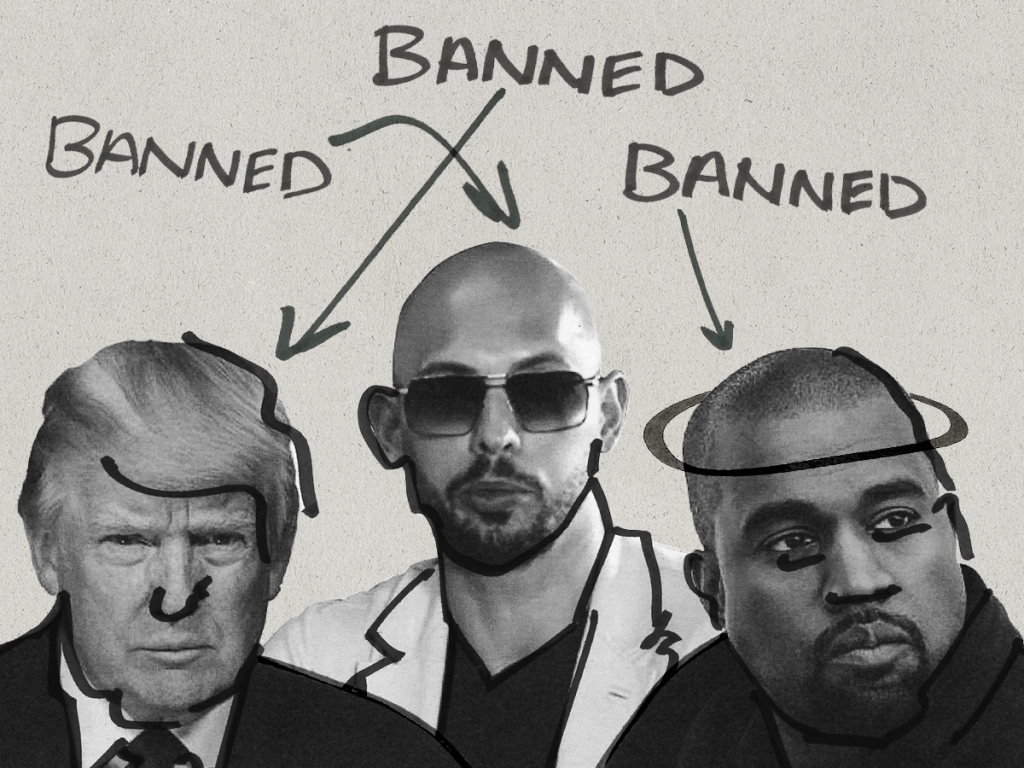Label volunteer Connor Forbes dissects the debate on when the right time is to restrict celebrities on social media – before or after they have incited a riot on the capitol building of the U.S?
In a digital world where social media is more accessible than ever before, we are not always going to find the most respectful people online; but even the most powerful of figures are not safe from the community guidelines.
Recently we have seen artists, influencers, and even presidents slammed by what is defined as “cancel culture”, but this trend begs the question of when is it acceptable to remove someone from social media, if at all?
Most recently in October Ye, formerly known as Kanye West, was restricted on online platforms after antisemitic posts on his Instagram. Though a fair response, it has sparked the conversation of where we draw the line between free speech and hate speech as well as how social media conglomerates should combat oppressive individuals.
Initially, we must tackle the question of why someone should be banned on social media. From the most topical examples it seems to me as though the biggest threat that persons like West and Trump pose, is the influence they hold on to others.
When Donald Trump was permanently banned on social media after the storm of the Capitol building, Twitter CEO Jack Dorsey stated this was “due to the risk of further incitement of violence.” Whilst this does highlight how Trump posed a very real and dangerous threat last year by instigating his far-right supporters into extremist violence, we must also remember the countless racist and sexist comments from the former President recorded on his social media and in the mainstream before he was even elected to office. Such remarks did not garner reaction from Twitter or Facebook; this supports the argument that, as of late, companies have been more vigilant against hate speech online.
Both Andrew Tate and Kanye West were restricted because of their sexist and antisemitic statements, respectively.
Andrew Tate became a symbol of controversy earlier this year with his bigoted views against women though it was only when it was realised that Tate targeted an impressionable, younger male audience that companies such as Twitter, Facebook and YouTube would restrict his accounts. This further supports the idea that social media bosses respond to the negative influence that people like that of Tate hold, rather than the negative content that they generate. However, it is still debated on whether Andrew Tate should have been initially restricted on social media, with many claiming it is in violation of free speech.
In my opinion free speech is a universal right whereas hate speech is when a person takes advantage of that right to oppress another person or group – I believe many people would argue that Andrew Tate used his platform to spread hate towards women and deserved to be restricted online.
We must also ask ourselves how long someone should be banned on social media. For example, whilst Trump was initially hit with a permanent ban on Facebook and Instagram in January 2021, it was not until June that the company now known as Meta declared it would reconsider the length of the ban in 2023. The same can be said for Kanye who was previously restricted on Instagram before returning to the platform earlier this year, calling into question now after the most recent controversy if someone should be permanently banned, under the belief that they would repeat hateful behaviour upon returning. Some major celebrities including Elon Musk would disagree with this: when detailing his plans to buy Twitter during a Financial Times conference he would remove the ban on Trump, calling it “flat-out stupid” as it “didn’t end Trump’s voice.”
When we have the technologies that allow anyone to say whatever they want from behind a keyboard, the topic of free speech will be always discussed. However, I firmly advocate that those with power must be held accountable above anyone as they – more than anyone else online – have the capacity to push those same views on their supporters.
For those who abuse their free speech to spread further bigotry around the world, we must have systems that silence them so that the digital world can truly be for everyone.
Edited By: Rachel Cannings (Cultural and Entertainment Editor)
Designed By: Sarim Mangi (Head of Design)


